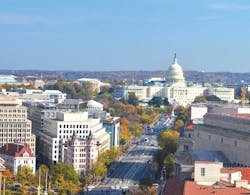Net-Zero Feasible in D.C.
What if the Smithsonian, the White House, and the Lincoln Memorial were completely self-sufficient with water and energy?
While the District of Columbia is already home to more green buildings per capita than other large cities in the U.S., a new report sheds light on how the capitol can incentivize zero energy, zero water, and living buildings.
Taking the next step beyond LEED standards, the district could slash energy use by half from 2010 levels by 2032. Other benefits include:
- For a 1-3% added initial cost of construction, new developments could save up to 60% of their energy consumption.
- The return on investment for deep energy efficiency is 6-12%. This rises to 33-36% when modeled for net-zero energy using solar power.
- Advanced water conservation measures to reduce potable consumption and stormwater runoff from the buildings cost 1-3% yet conserve 45-60% of the water usage and have a return on investment of 5-10%.
- Stormwater retention measures included in the costs mentioned above eliminate stormwater runoff from most weather events and allow buildings to retain water during catastrophic storm, making the district more resilient against climate change.
The study, Net Zero and Living Building Financial Study: A Cost Comparison Report for Buildings in the District of Columbia, conceptually transformed three LEED v3 Platinum designed buildings to net-zero energy, net-zero water, and Living Building Challenge standards. Its scope focused on three common building types: office new construction, multifamily new construction, and office renovation.
A set of energy conservation strategies and rainwater harvesting techniques were applied to each building to arrive at reduced energy and water usage before photovoltaics and water reuse strategies were applied. The research was conducted by New Buildings Institute, International Living Future Institute, and Skanska.
To encourage more deep green projects, the report recommends that D.C. update energy codes, provide additional incentives for sustainable buildings, revise net metering policies, and identify and remove regulatory impediments.
